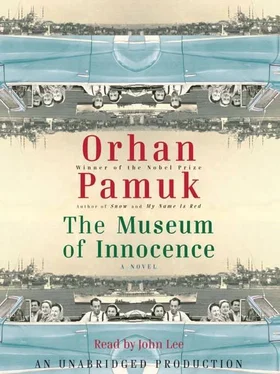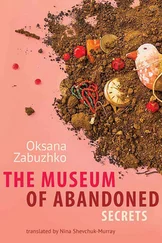For a time we were silent.
The İnci Patisserie had been an important landmark of my childhood excursions to Beyoğlu with my mother, and in thirty years it hadn’t changed a bit, though it was more crowded than I remembered, and that made it harder to speak.
When, for a moment, a mysterious silence fell over the whole patisserie, I whispered that I loved her very much and would obey her every wish, desiring nothing else in the world than to spend the rest of my life with her.
“Really?” she said, in the same childish manner as when doing her math homework.
She was confident and determined enough to laugh at her own words. Carefully lighting another cigarette, she enumerated her other demands: I was never to hide anything from her, I would share all my secrets, and whatever question she asked about my past, I was to answer it truthfully.
As I listened, everything I saw engraved itself upon my memory: Füsun’s stern, willful expression, the patisserie’s ancient ice cream machine, and the framed photograph of Atatürk, whose frown so closely resembled Füsun’s. We decided that the engagement should happen before we went to Paris, and that it should be a small family affair. We spoke of Feridun with respect.
Returning to the subject of sexual relations, she expressed her clear wish to wait until after marriage in the following terms: “Don’t try to force me, okay? It won’t work anyway.”
“I know,” I said. “Actually, I’d prefer this to be an arranged marriage.”
“It can almost count as one!” she said, sounding so very certain.
She went on to say that without a man in the house anymore, the neighbors might jump to conclusions if I continued coming to supper every night. (Every night?) “Of course, I don’t really care about the neighbors; they won’t be my neighbors for long,” she said later. “I just can’t have those same sweet conversations without my father there. It’s so painful.”
For a moment I thought she was going to cry, but she held herself together. The patisserie had swinging doors, but now a great influx was holding them open. A crowd of lycée students in navy jackets, their thin ties askew, were pushing their way in, laughing boisterously and jostling one another. Before long we rose to leave. Taking no end of pleasure from escorting Füsun through the Beyoğlu crowds, I walked silently by her side as far as Çukurcuma Hill.
76 The Cinemas of Beyoğlu
WE MANAGED to honor the spirit of the conditions Füsun had set out at the İnci Patisserie. I immediately arranged for an army friend of mine, a lawyer who lived in Fatih-a world away from Nişantaşı-to represent Füsun in what was, after all, a straightforward case, since the couple had made a mutual decision to divorce. Füsun had told me with a smile that Feridun had also considered asking me to recommend him a lawyer. Though I could no longer visit her in Çukurcuma, we met every other day in Beyoğlu and went to see a film.
Even as a child, I’d always treasured the coolness of the Beyoğlu cinemas as the streets grew warmer with the progress of spring. Füsun and I would meet in Galatasaray, and after considering all the posters we would select a theater, buy our tickets, and step into the cool, dim, and mostly empty seats, where, by the light reflected off the curtains, we would find a secluded place at the back, to hold hands, and watch the film at leisure, like people with all the time in the world.
At the beginning of summer, when the cinemas began to show two or three films for the price of one, I remember a day when I’d sat down, adjusting my trousers to be as comfortable as possible, setting my newspapers and magazines on the empty seat beside me, thus deferring my blind search for Füsun’s hand, and before I could act, it landed on my lap like an impatient sparrow, opening expectantly on my belly for a moment, as if to ask, Where are you? And at that moment, moving faster than my soul, my hand wrapped itself longingly around hers.
Those Beyoğlu theaters with summertime double features (the Emek, the Fitaş, and the Atlas) and even those showing three films (the Rüya, the Alkazar, and the Lale) did away with the traditional five-minute intermission midfilm; and so it would not be until the lights went up between features that we would see what sort of an audience we’d been sitting with. During these intervals, as we watched the lonely men in wrinkled clothes, holding wrinkled newspapers, sprawled or reclining or doubled over in the seats of these huge, mildewy, dimly lit halls, and the elderly dozing in corners, and those desirous souls who had such a hard time wrenching themselves from the dream world of the film back to the reality of the dusty, murky theater, Füsun and I would exchange our news in whispers, though never holding hands. It was at one such interval, in a box at the Palace Cinema, that Füsun whispered the words I’d been awaiting for eight years: She and Feridun were officially divorced.
“The lawyer has the papers,” she said. “Now I am legally a divorcée.”
In that instant the gilded ceiling of the Palace Cinema, its faded glamour and its peeling paint, and its curtains, and its stage, and its drowsy slouching patrons, engraved itself forever in my memory. Even as recently as ten years ago, couples still used theater boxes at the Atlas and the Palace as they used Yıldız Park, to hold hands and kiss in private; while Füsun wouldn’t let me kiss her while we were sitting in a box, she did not stop me from resting my hand on her legs or petting her knees.
My last meeting with Feridun reached the necessary resolution, but contrary to my hopes and expectations, it left me with a bad taste in my mouth. I’d been shocked by Füsun’s insistence at the İnci Patisserie that they’d never made love, and by her demand that I believe this, because, after all, I (like so many men in love with married women) had been secretly clinging to this idea for eight long years. This is, in fact, the crux of our story, for it explains why I had been able to stay in love with her so long.
Had I dwelled long and hard and openly on the notion of Füsun and Feridun’s enjoying full marital relations (a painful proposition I’d tested once or twice with no desire to repeat the experience), my love could not have survived. Yet, when, following years of successful self-deception, Füsun had commanded that I had no choice but to believe it, I immediately and unequivocally told myself that it couldn’t be true, and indeed even bristled at the thought that she was tricking me. But as Feridun had in fact left her after six years of marriage, the deception clung by a reed of hope, though a moment’s thought to the contrary would make me unbearably jealous and also angry at Feridun, keen to humiliate him. We had muddled through eight years without conflict precisely because I’d felt no anger toward this man. Eight years on, it was easy to understand how their happy sex life had permitted Feridun to tolerate me, especially at the beginning. Like any man who is happy with his wife but also enjoys the company of friends, Feridun had wanted to spend the evenings in the coffeehouse relaxing and talking about work. As I looked into Feridun’s eyes, I was obliged to accept another fact I had long hidden from myself: that my presence had curtailed the happiness Füsun might have shared with her husband during the early years of their marriage.
It was during my last meeting with Feridun that I first heard the murmurings of the jealousy that had been lying voiceless and dormant for eight years, in the oceanic depths of my consciousness, and I decided then and there, as I had with certain old friends of my circle, that I would never see him again. Those who knew how, for many years, Feridun had been like a brother to me, and those who had pined for Füsun before I even knew her, may find it inscrutable that I should have borne him such ill will just as things were going my way. Suffice it to say that after so many years of seeing Feridun as an enigma, I was coming to understand him, and with that, let us close the subject.
Читать дальше












